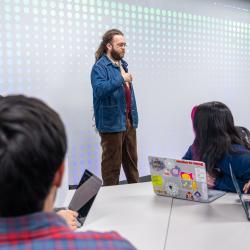Senior Sadia Nourin Pledges to Fight Censorship with Internet Society Pulse Research Fellowship

With this funding that supports developing data-driven analyses or tools that advance a more reliable internet, Nourin will spend the next six months developing a novel method for detecting internet disruptions in countries where it is hard to get local vantage points.
Following software engineering internships at Technuf and Capital One, Nourin’s interest in cybersecurity research began when she attended a presentation about Geneva, an artificial intelligence system designed by UMD computer scientists that automatically evolves to evade internet censorship.
“I was present during a presentation on Geneva, which allows novel experimental genetic algorithm that evades censorship, and I liked the entire project,” Nourin said. “It was essentially an open-source algorithm that can determine these network packet sequences that evade censorship in big powerful nation states and I found that interesting.”
The presentation sparked her curiosity for research and her passion for helping make the world safer and more accessible, ultimately changing her career path. She decided to join the Geneva team and the Breakerspace lab, which Assistant Professor Dave Levin leads.
“UMD is great when it comes to figuring out if students want to do research and guiding them every step of the way,” Nourin said. “I am focused on censorship research because it piqued my interest and I am also thinking about expanding into privacy and network security domains.”
The Internet Society Pulse Research Fellowship focuses on internet resilience and shutdowns, which aligns well with Nourin’s research interests in censorship resistance, evasion and measurement. While most censorship research focuses on nations such as China, Iran and India, which have intricate censorship systems, Nourin examines smaller countries often overlooked in censorship research, such as Turkmenistan, Myanmar and Yemen.
“One of the more important things I look at is censorship measurement to figure out what is being censored in smaller and more overlooked countries,” Nourin said. “I plan to have a longitude aspect to this because, during political upheavals and elections, we can see that censorship goes up or down, but this needs work on smaller nations that don’t have the infrastructure.”
Along with collaborators at UMD and the University of Chicago, Nourin created the first set of tools that make it possible to study smaller countries’ censorship behaviors comprehensively.
“Sadia and her colleagues developed techniques for measuring how each IP address inside Turkmenistan is subjected to censorship,” Levin said. “No other measurement efforts in any other country have achieved such a comprehensive understanding.”
According to Levin, Nourin discovered the first censorship circumvention strategies that are unique to Turkmenistan.
“It is not an overstatement to say that Sadia’s work will help make the internet a freer and more open place for those living in Turkmenistan and other countries,” Levin said.
As she starts her fellowship, Nourin looks to the future and how her work can make a sizable impact.
“With the fellowship, I want a long-term measurement system that goes hand in hand with all the current measurement systems,” Nourin said, “and having that run in the foreseeable future will give us insight into what is happening in these countries.”
—Story by Samuel Malede Zewdu, CS Communications
The Department welcomes comments, suggestions and corrections. Send email to editor@cs.umd.edu.







